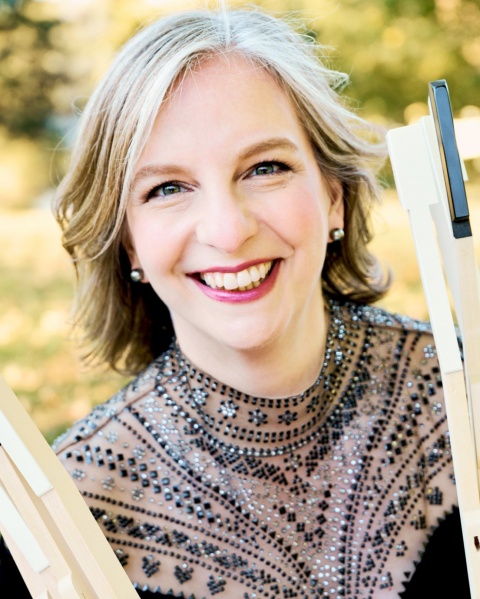Columbia College | Columbia University in the City of New York
Take Five with Orli Shaham ’97

Photo by ALEKS KARJAKA
Her catalog of recordings, which include works by Mozart, Brahms and John Adams, have received worldwide accolades. Orli Shaham’s Bach Yard, a live interactive concert series for young children that she founded in 2010, is recognized by parents, media and the music community as a significant force in music education and entertainment.
What were you like when you arrived at Columbia?
Across the board, in every aspect, I was utterly clueless. I had little idea what to expect other than that there would be classes and I’d continue being a student. I would continue to practice the piano and take lessons at The Juilliard School — I knew how to do all that. The rest of it was a mystery. I didn’t know how to find the bursar’s office (didn’t even know what “bursar” meant!), I didn’t know how best to plan my schedule, I could never remember what floor each building’s entrance was and frequently found myself out of breath having mistakenly gone up an extra flight or two of stairs, I didn’t know how not to stay up until 4:00 a.m. studying the night before an exam, and I had no idea how lucky I was.
What do you remember about your first-year living situation?
I lived off-campus, which was really unusual. Because I was already a serious pianist and simultaneously studying at Juilliard, I got special permission to live either in my parents’ home in the Bronx or in an apartment within a certain radius of campus so I could have unlimited access to my piano and not have to worry about practice room schedules. It took months for me to find an apartment, so until then I commuted on the 1 train to and from Riverdale. I also took that train between the two campuses; I remember feeling quite proud as I worked out exactly where to stand on each platform in order to be nearest the exit when I disembarked. You could call that my first step toward “adulting.”
What Core class or experience do you most remember, and why?
I loved the Core, and I appreciate it more every year that passes. I learned so much about how human communication works, whether it’s verbal, written, visual or aural. I learned so much about creating, as well as about listening to and receiving the communication of others. It made me feel connected to the world. There were moments of epiphany for me in almost every Core class, but one that stands out is from Art Hum. I was lucky to have Professor Barry Bergdoll ’77, GSAS’86, and as I am not by nature visually oriented, every class was revelatory. It was like discovering a new foreign language. I found my entire worldview, my entire understanding of human history and interactions, fundamentally shifting twice a week. And my sad attempt to draw the front of Low Library remains one of my favorite homework assignments of all time.
Did you have a favorite spot on campus, and what did you like about it?
Indoors, I always had a fondness for the stacks in Butler Library. I would find a desk in an unoccupied corner and read endlessly, which is the principle pastime of a history major. As this was before laptops and the internet, there were no distractions there save for the hundreds of books beckoning for me to read them next. My favorite outdoor spot was the set of stairs that leads to campus at 117th and Broadway. Coming onto campus that way rather than via College Walk always made me feel like I owned the place, like it was all there for my taking. I would head straight into Dodge and one of the many music history courses I took with Professor Elaine Sisman and enjoy the confidence that comes from using the lesser-known entrance.
What, if anything, about your College experience would you do over?
I would happily repeat all of it in exactly the same way except for the awkward socializing. I wish I had actively taken more time to spend with my brilliant classmates. Living off-campus and having two groups of colleagues at the two schools made that tricky. But aside from that, I wouldn’t change a thing. Each of the classes I took changed me and added to who I am today. Outside of the Core and of my major, I managed in those four years to study Native American literature with Professor Karl Kroeber GSAS’56, evolutionary biology with Professor Robert Pollack ’61, “Physics for Poets” with Professor Erick Weinberg, 19th-century British novels with Professor Edward Mendelson, all about our place in evolution and our primate cousins from Professors Don Melnick and Marina Cords, and a half dozen other fascinating topics. Within my history major, every moment in Professor Alan Brinkley’s lectures on 20th-century America was riveting, as was Professor David Cannadine’s British history survey. I couldn’t believe the extent of what I didn’t know about the history of Jews in America, learned from Professor Michael Stanislavski. My ultimate highlight was the WWII seminar with Professor Fritz Stern ’46, GSAS’53, which I finally managed to get into spring semester of senior year. One of the many things I learned from that class is that I effortlessly did my best work ever for him because his standard was so high. I have used that knowledge as a teacher ever since. That’s the essence of the College experience for me — the teaching was so good that I was even learning things I didn’t realize I was learning.

